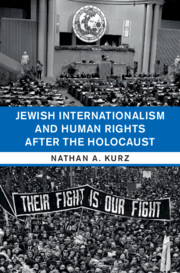Book contents
- Jewish Internationalism and Human Rights after the Holocaust
- Human Rights in History
- Jewish Internationalism and Human Rights after the Holocaust
- Copyright page
- Dedication
- Contents
- Acknowledgments
- Abbreviations
- Dramatis Personae
- Introduction
- 1 “Individual Rights Were Not Enough for True Freedom”
- 2 Who Will Tame the Will to Defy Humanity?
- 3 The Consequences of 1948
- 4 Exit from North Africa
- 5 From Antisemitism to “Zionism Is Racism”
- 6 The Inadequacy of Madison Avenue Methods
- 7 “Good Words Have Become the Servants of Evil Masters”
- Conclusion
- Notes
- Bibliography
- Index
5 - From Antisemitism to “Zionism Is Racism”
Published online by Cambridge University Press: 05 November 2020
- Jewish Internationalism and Human Rights after the Holocaust
- Human Rights in History
- Jewish Internationalism and Human Rights after the Holocaust
- Copyright page
- Dedication
- Contents
- Acknowledgments
- Abbreviations
- Dramatis Personae
- Introduction
- 1 “Individual Rights Were Not Enough for True Freedom”
- 2 Who Will Tame the Will to Defy Humanity?
- 3 The Consequences of 1948
- 4 Exit from North Africa
- 5 From Antisemitism to “Zionism Is Racism”
- 6 The Inadequacy of Madison Avenue Methods
- 7 “Good Words Have Become the Servants of Evil Masters”
- Conclusion
- Notes
- Bibliography
- Index
Summary
This chapter recounts the legislative and political history of the first international debate on antisemitism, which through a convoluted series of events concluded with the introduction into international legal discourse of the notion that Zionism was a form of racial discrimination. Antisemitism came onto the UN’s lawmaking agenda after a series of antisemitic incidents that began in West Germany and spread all over the world, dubbed the Swastika Epidemic. However, the initial political momentum could not be sustained, and a UN inquiry into the events failed to lead to an international convention against antisemitism. Moreover, after five years of negotiations, the International Convention on the Elimination of All Forms of Racial Discrimination did not even mention antisemitism and only singled out apartheid in South Africa for specific opprobrium. Negotiations over an international antiracism treaty exposed antisemitism’s diminished place in a decolonizing world, previewed the power of an automatic anti-Israel bloc at the UN, and, most crucially, revealed the self-inflicted costs of calling attention to Soviet antisemitism. American and Israeli Cold War hawks managed to transform antisemitism from a problem of incitement against Jewish minorities into a political device meant to embarrass the Soviet Union in the Cold War.
Keywords
- Type
- Chapter
- Information
- Jewish Internationalism and Human Rights after the Holocaust , pp. 112 - 137Publisher: Cambridge University PressPrint publication year: 2020

